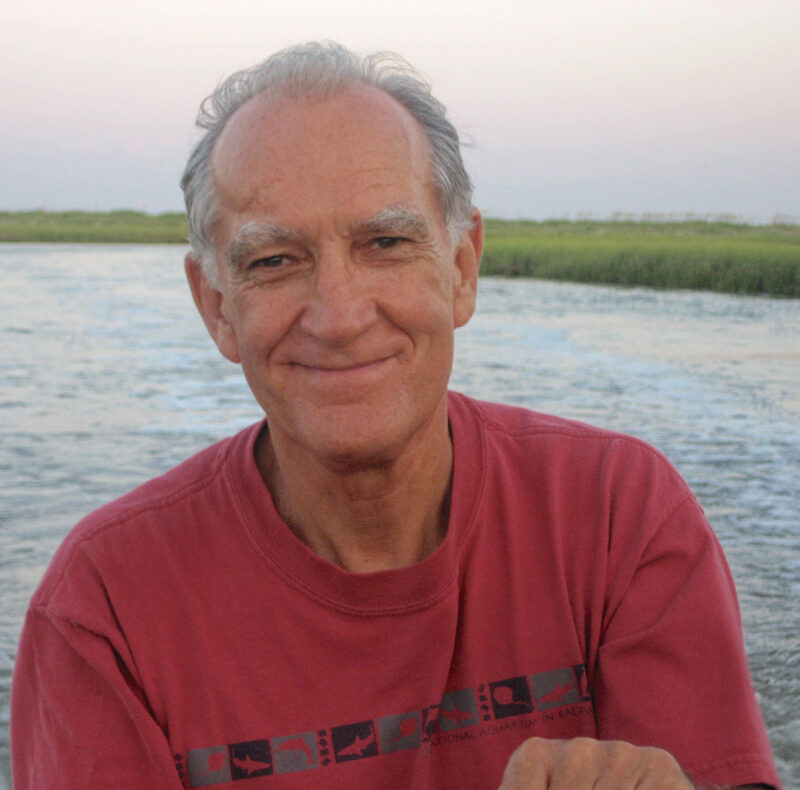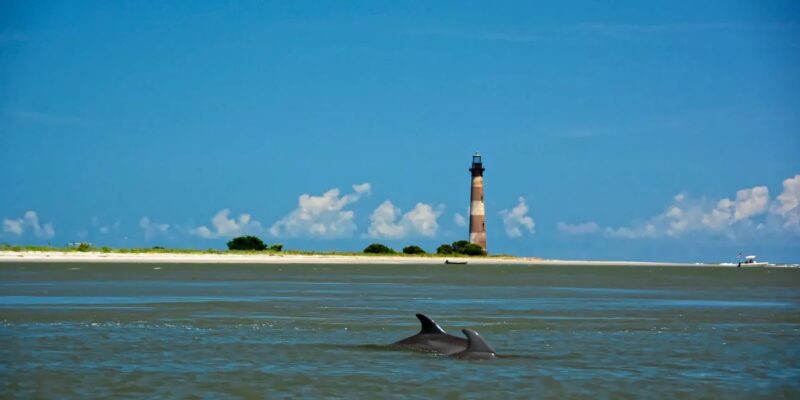
A ‘loving approach to life’ in Folly Beach: 1968 graduate reflects on college, career, and community

Richard Beck, who grew up in the Charleston area, is a retired dentist and a member of the Erskine College Class of 1968. He recently wrote and published Remaining Folly: A Sea Island’s Journey. On its cover the book is described as “A Chronicle of the Landscape & Political History of Folly Beach, South Carolina, 1972-1992.” Beck calls it “a cautionary tale.” The book was based in part on his experience as a city councilman (1978-1982) and mayor (1982-1989) in Folly Beach. Here, he speaks about his Erskine experience, his career, and the path that led him to write his book.
The first college graduate in his family, Richard Beck says he “came to Erskine because of my high school librarian, Mrs. Mary Dunbar Dusenberry.” He was planning to attend the University of South Carolina, but Dusenberry suggested that he consider Erskine College. “Knowing you, I think it would be a really good fit,” she told him.
Sure enough, the young Beck “got invited to a scholarship weekend and fell in love.” He was willing to work to make up the difference in cost so that he could go to Erskine, and he was blessed with support from his parents.
“Between my summer job as a service station attendant and my parents borrowing $600 per year and the work scholarships that Erskine provided, I was able to attend,” he recalls.
By his sophomore year, Beck had decided that he wanted to go to medical school, so he focused on chemistry and biology, graduating with a chemistry major. He says he “thought a lot of all my professors,” but singles out William Pressly “as both an excellent teacher and an adorable character.”
“When I thought about medicine, dentistry seemed like a good path because of the independence that it offered,” he says, noting that he “had terrible teeth as a kid” and spent a lot of time in the dentist’s chair. “I already knew a pretty good bit about it from being such a frequent patient,” he jokes.
On the Erskine campus, Beck was a member of the Dramatics Club, served on the Entertainment Board, played on Erskine’s first soccer team, and was the singer in a 13-piece Erskine band, “The Entertainers,” which won the South Carolina Battle of the Bands contest for Erskine in 1967. It was through a member of the band, 1969 graduate Dan Sneed, that Beck was able to spend hours observing a dentist in Anderson, “getting a picture of what the practice of dentistry was like,” he says.

“Through Dan I met his girlfriend, later wife, Cherrie Beard. Cherrie’s dad was Dr. Joe Beard, who practiced dentistry in Anderson,” Beck explains. “Cherrie told him that I was interested. He was a loving, gentle practitioner, and he encouraged me to apply to what would be the second class to graduate from the MUSC School of Dental Medicine. I applied, was accepted, and graduated in 1972.”
Beck began his work as a dentist by treating underserved children in Pickens County, South Carolina. “We treated the three- to twelve-year-old children who qualified for care under [a federal program]. We had a mobile dental unit that would spend the school year traveling between the elementary schools and the summers in Easley,” he recalls.
“I met so many wonderful educators and children that I fell in love with public health dentistry,” he says. But he wanted to go back to the Low Country. “I missed the ocean, and when I was asked to write a grant proposal for a program to serve the underserved on Yonges Island, south of Charleston, I jumped at the chance.”
The grant was approved, and he moved back to his home part of the state “to serve, not as the head of the program, but as an employee.” Sadly, he found that the program was “unable to create a system that delivered quality care, so, reluctantly, I left to start my own practice.”
It was one of his dental patients who approached him about running for city council in Folly Beach and, as he describes it, he “sort of wandered into local politics.” Then again, “As I think back on my decision to become involved, I believe that Erskine played a role,” Beck says.
“I think attending Erskine affects everything you do after you graduate. The relationships that exist between the students and faculty at Erskine engender a loving approach to life that fosters giving back.”

Once elected to city council, he became concerned about the beach town’s “severe erosion problems and quality of life issues.” His served on the city council and as mayor “during a time when the basic character of the island was being challenged by … developers” whose plans threatened to “change the look and feel of the town.”
Beck is proud of his work in local politics. During his 11 years of service, Folly Beach fought off six major development projects, he says. “[We] proved that the jetties were the proximate cause of our erosion problem, secured a 50-year commitment on the part of the U.S. Army Corps of Engineers to fund a renourished beach, and obtained an exemption from the elements of the 1988 beachfront management law that would have irreparably harmed my community.”
Aware that he had entered public service at “a pivotal time in the history of the community,” he had not considered writing a book about it until he realized “how ephemeral institutional memory is.”
That realization came when he was invited to speak at the celebration of the 40th anniversary of the incorporation of Folly Beach. As other former mayors spoke about their time in office, “I realized how much of the story was missing,” he says. “I began researching and writing stories about the development of Folly’s character from 1670 to today.”
A conversation with a friend helped Beck to find a writer’s group. “I began the journey into learning the craft of writing. Telling Folly’s story was a labor of love.”
Beck’s wife Karen brought another sort of love into his life. He met her on a blind date, and on that occasion, he admits he was “so flustered that I didn’t feel worthy of speaking to her—not a very good approach.” They married two years later. “I am fortunate to have experienced her children and grandchildren and the rest of her large and raucous family for the last 12 years,” he says. “We still live on Folly, spend time on the beach and in the boat.”
He has served on the board of directors for Save the Light Inc. for 23 years, working to preserve the Morris Island Lighthouse. He also runs a Dolphin Tour—more about that can be found here.
“I am trying to get as many people as possible to read my book,” Beck says, “as it is a cautionary tale for every town as South Carolina grows quickly, seemingly without regard for preserving the fragile fabric of community.”
Photos courtesy of Richard Beck
